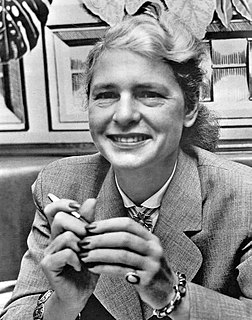A Quote by Maggie Stiefvater
His face was just strange enough that she wanted to keep looking at it.
Related Quotes
Funny enough, if you are looking at people these days who are putting Botox in their face and getting all sorts of plastic surgery, we look at them and go, I can tell you've had Botox. I can tell you've had plastic surgery. You look really strange to me. But no one's saying anything. We're just accepting the fact that they're strange-looking.
I never get tired of looking at her [Catherine Keener] and it always surprises me, despite how many hours of film I've shot on that face. She's fantastic. She does comedy and tragedy so equally well. She wears her feeling so on the surface for both. I try to stop myself from casting her but I just keep coming back to her. She's just so fantastic to work with.
Gabriel pulled her over his body to lie on the bed beside him. His kisses pressed her down into the oblivion of the mattress as her hands explored his chest, his shoulders, his face. "I want to lay my kill at your feet," he said, more growl than words, and held her tight by her hair as he marked her neck with his teeth. She writhed against him. She wanted to bite him, she wanted to rip the flesh from his back, but most terrible of all, she didn't want him to stop. Her back arched, her body shattered, she howled.
She looked at his young face, so full of concern and tenderness; and she remembered why she had run away from everyone else and sought solitude here. She yearned to kiss him, and she saw the answering longing in his eyes. Every fiber of her body told her to throw herself into his arms, but she knew what she had to do. She wanted to say, I love you like a thunderstorm, like a lion, like a helpless rage; but instead she said: "I think I'm going to marry Alfred.
He stepped toward her, and her heart just ached from it. His face was so handsome, and so dear, and so perfectly wonderfully familiar. She knew the slope of his cheeks, and the exact shade of his eys, brownish near the iris, melting into green at the edge. And his mouth-she knew that mouth, the look of it, the feel of it. She knew his smile, and she knew his frown, and she knew- she knew far to much.
The stories never said why she was wicked. It was enough to be an old woman, enough to be all alone, enough to look strange because you have no teeth. It was enough to be called a witch. If it came to that, the book never gave you the evidence of anything. It talked about "a handsome prince"... was he really, or was it just because he was a prince that people called handsome? As for "a girl who was as beautiful as the day was long"... well, which day? In midwinter it hardly ever got light! The stories don't want you to think, they just wanted you to believe what you were told.
The good enough mother, owing to her deep empathy with her infant, reflects in her face his feelings; this is why he sees himselfin her face as if in a mirror and finds himself as he sees himself in her. The not good enough mother fails to reflect the infant's feelings in her face because she is too preoccupied with her own concerns, such as her worries over whether she is doing right by her child, her anxiety that she might fail him.
He began to trace a pattern on the table with the nail of his thumb. "She kept saying she wanted to keep things exactly the way they were, and that she wished she could stop everything from changing. She got really nervous, like, talking about the future. She once told me that she could see herself now, and she could also see the kind of life she wanted to have - kids, husband, suburbs, you know - but she couldn't figure out how to get from point A to point B.
The certainty that she would find what it was she sought just slipped away, until one night she knew there was nothing, no one waiting for her. That no matter how far she walked, how carefully she searched, how much she wanted to find the person she was looking for, she was alone" - The Forgotten Garden
It wasn't just that Lucy wanted to help him. She wasn't as selfless as that. She was madly attracted to him. She was attracted to all of the normal things and the weird things, too, like the back of his neck and his thumbs on the edge of his desk and the way his hair stuck out on one side like a little wing over his ear. She caught his smell once, and it made her dizzy. She couldn't fall asleep that night.

































